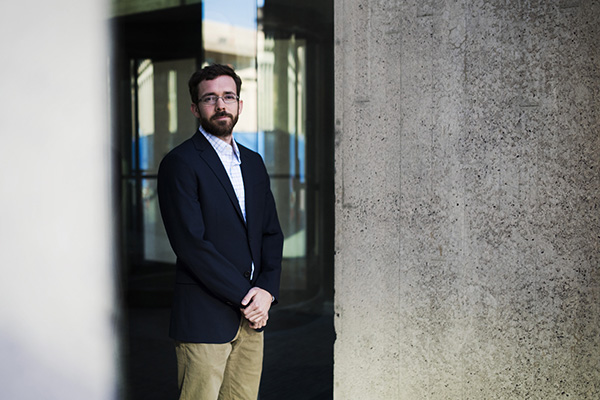
By Thea Singer
News at Northeastern
BOSTON–Facebook as a fountain of youth? Well, not exactly. But new research co-led by Northeastern’s William R. Hobbs suggests that use of the social media platform is associated with longer life, particularly if the time spent online is moderate and the user’s online activities reflect strong social interactions in the offline world.
The findings support decades of research showing that social relationships in real life contribute to longevity and that social isolation does the opposite. They are the first, however, to reveal that the association holds in the online world.

Hobbs, a postdoctoral research fellow in the lab of Distinguished Professor of Political Science and Computer and Information Science David Lazer, is quick to point out that the study shows associations only and not cause and effect. Still, he suggests a possible explanation for the results.
“Given the very strong association between real-world interactions and better health, it could be that the more you have moderate interactions online, the more likely you are to be friends with your Facebook friends offline as well, reinforcing the relationships,” says Hobbs, who conducted the research while a graduate student at the University of California, San Diego.
“Most Facebook users engaged in moderate levels of online interactions. However, when numbers of online interactions were extreme, and when we didn’t see evidence of users being to connected to people offline, we saw associations with worse health.”
The research, co-led by UC San Diego professor James Fowler, was published Monday in the journal PNAS.
“You’ve got to have friends”
For the study, the researchers measured the Facebook activity of 12 million California-based Facebook users for six months in 2011 and compared the profiles against California Department of Public Health vital records for 2012 and 2013 to determine mortality status and cause of death. They measured number of friends, photos, status updates, and messages and friend requests sent. The users were all born between 1945 and 1989, and each was compared only with users of the same age and gender. For the analysis itself, to preserve privacy, the data was aggregated and “de-identified,” that is, all elements that associated the data with an individual were removed.
Before examining the users’ behavior, the team wanted to know how the users compared to the general population. To cut down on bias, the researchers turned to a more homogeneous subgroup—users and nonusers on the California voter rolls.
There they found that the risk of dying in a given year was about 12 percent less for users than nonusers. In the paper, however, they caution “not to read too much into the comparison,” because they couldn’t control for myriad confounding factors—such as marital status and education—given that they knew so little about the nonusers.
Comparing the users to one another was another story. For them they could control not only for age and gender but also for marital status, length of time on Facebook, and smartphone use (a proxy for income).
The results were telling but not surprising, given the historical evidence regarding the health benefits of social relationships. Users with large or average social networks, in the top 30 to 50 percent, lived longer than those in the lowest 10 percent, according to Hobbs.
The researchers were particularly surprised that initiating friendships did not correlate with better health even though accepting them did. “You would think that the association would go both ways,” he says. “That was a disappointing finding because it suggests that telling people to go out and make more friends might not improve their health. On the other hand, it may be that people who live longer are more attractive to other people in the first place.”
Lazer, who is also co-director of the NULab for Texts, Maps, and Networks, sees the study as paving the way for new avenues of research regarding big data and health. “It is innovative to connect Facebook behaviors to health and mortality outcomes,” he says. “The identification of these patterns will hopefully spur further research on the nature of the relationship between our social networks and health-related outcomes.”
(Published with permission from News at Northeastern)













